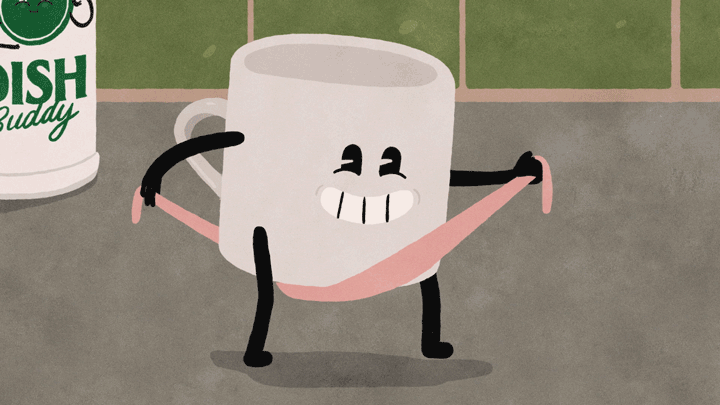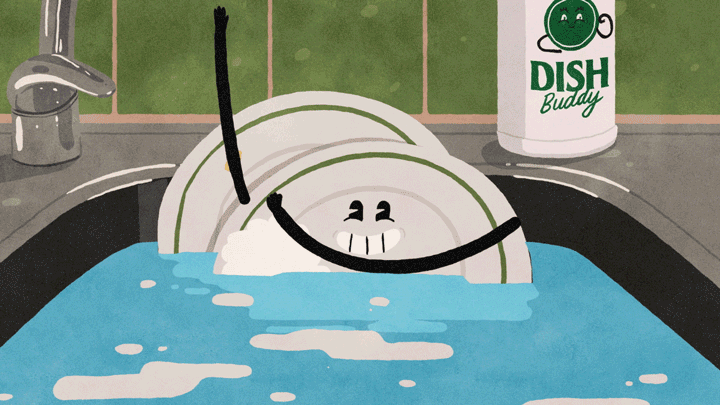- Schools
- Volunteering
- Offices
- House prices
- Community cohesion
- High street
- Home delivery
- Deepfakes will influence the 2020 election—and our economy, and our prison system (Quartz) — “The problem doesn’t stop at the elections, however. Deepfakes can alter the very fabric of our economic and legal systems. Recently, we saw a deepfake video of Facebook CEO Mark Zuckerberg bragging about abusing data collected from users circulated on the internet. The creators of this video said it was produced to demonstrate the power of manipulation and had no malicious intent—yet it revealed how deceptively realistic deepfakes can be.”
- The Slackification of the American Home (The Atlantic) — “Despite these tools’ utility in home life, it’s work where most people first become comfortable with them. 'The membrane that divides work and family life is more porous than it’s ever been before,' says Bruce Feiler, a dad and the author of The Secrets of Happy Families. 'So it makes total sense that these systems built for team building, problem solving, productivity, and communication that were invented in the workplace are migrating to the family space'.”
- You probably don’t know what your coworkers think of you. Here’s how to change that (Fast Company) — “[T]he higher you rise in an organization, the less likely you are to get an accurate picture of how other people view you. Most people want to be viewed favorably by others in a position of power. Once you move up to a supervisory role (or even higher), it is difficult to get people to give you a straight answer about their concerns.”
- Sharing, Generosity and Gratitude (Cable Green, Creative Commons) — “David is home recovering and growing his liver back to full size. I will be at the Mayo Clinic through the end of July. After the Mayo surgeons skillfully transplanted ⅔ of David’s liver into me, he and I laughed about organ remixes, if he should receive attribution, and wished we’d have asked for a CC tattoo on my new liver.”
- Flexibility as a key benefit of open (The Ed Techie) — “As I chatted to Dames and Lords and fiddled with my tie, I reflected on that what is needed for many of these future employment scenarios is flexibility. This comes in various forms, and people often talk about personalisation but it is more about institutional and opportunity flexibility that is important.”
- Abolish Eton: Labour groups aim to strip elite schools of privileges (The Guardian) — “Private schools are anachronistic engines of privilege that simply have no place in the 21st century,” said Lewis. “We cannot claim to have an education system that is socially just when children in private schools continue to have 300% more spent on their education than children in state schools.”
- I Can't Stop Winning! (Pinboard blog) - “A one-person business is an exercise in long-term anxiety management, so I would say if you are already an anxious person, go ahead and start a business. You're not going to feel any worse. You've already got the main skill set of staying up and worrying, so you might as well make some money.”
- How To Be The Remote Employee That Proves The Stereotypes Aren’t True (Trello blog) — “I am a big fan of over-communicating in general, and I truly believe that this is a rule all remote employees should swear by.”
- I Used Google Ads for Social Engineering. It Worked. (The New York Times) — “Ad campaigns that manipulate searchers’ behavior are frighteningly easy for anyone to run.”
- Road-tripping with the Amazon Nomads (The Verge) — “To stock Amazon’s shelves, merchants travel the backroads of America in search of rare soap and coveted toys.”
- 5 Great Resources for Remote Workers (Product Hunt) — "If you’re a remote worker or spend part of your day working from outside of the office, the following tools will help you find jobs, discover the best cities for remote workers, and learn from people who have built successful freelance careers or location-independent companies."
- Stop Managing Your Remote Workers As If They Work Onsite (ThinkGrowth) — "Managers need to back away from their conventional views of what “working hard” looks like and instead set specific targets, explain what success looks like, and trust the team to get it done where, when, and however works best for them."
- 11 Tools That Allow us to Work from Anywhere on Earth as a Distributed Company (Ghost) —"In an office, the collaboration tools you use are akin to a simple device like a screwdriver. They assist with difficult tasks and lessen the amount of effort required to complete them. In a distributed team, the tools you use are more like life-support. Everything to do with distributed team tools is about clawing back some of that contextual awareness which you've lost by not being in the same space."
- Satellite teams
- 2 or more teams are in different offices.
- Remote employees
- most of the team is in an office, but a few single employees are remote
- Fully distributed teams
- everybody is remote
- Remote first teams
- which are “basically” fully distributed
- but have a non-critical-mass office
- they focus on remote-friendly communication
- You need to announce meetings upfront
- You need to take notes b/c not everyone needs to join
- Be on time
- Have a meeting agenda
- Make sure it’s not overtime
- Communicate further related information in slack
- etc
- Dehumanisation: "communication tends to stick to structured channels"
- Interruptions and multitasking: "being responsive on the chat accomplishes the same as being on time at work in an office: it gives an image of reliability"
- Overworking: "this all amounts for me to the question of trust: your employer trusted you a lot, allowing you to work on your own terms , and in exchange, I have always felt compelled to actually work a lot more than if I was in an office."
- Being a stay at home dad: "When you spend a good part of your time at home, your family sees you as more available than they should."
- Loneliness: "I do enjoy being alone quite a lot, but even for me, after two weeks of only seeing colleagues through my screen, and then my family at night, I end up feeling quite sad. I miss feeling integrated in a community of pairs."
- Deciding where to work every day: "not knowing where I will be working everyday, and having to think about which hardware I need to take with me"
- You never leave 'work': "working at home does not leave you time to cool off while coming back home from work"
- Career risk: "working remotely makes you less visible in your company"
- Video conference calls: they're not a replacement for face-to-face meetings, but they're a lot better than audio only or just relying on emails and text chats.
- Home office: I have one separate to the house. Also, it sounds ridiculous but I've got a sign I bought on eBay that slides between 'free' (green) and 'busy' (red).
- Travel: at every opportunity. Even though it takes me away from my wife and kids, I do see mine a lot more than the average office worker.
- Realistic expectations: four hours of solid 'knowledge work' per day plus emails and admin tasks is enough.
Saturday sailings
I deactivated my Twitter account this week. I've done that before, but this time I'm honestly not sure if I'll reactivate it.
Given that I get a fair few links through Twitter, I wonder if the kind of things I share in these weekly link roundups will change? We shall see, I guess. You can connect with me via the Fediverse: https://mastodon.social/@dajbelshaw
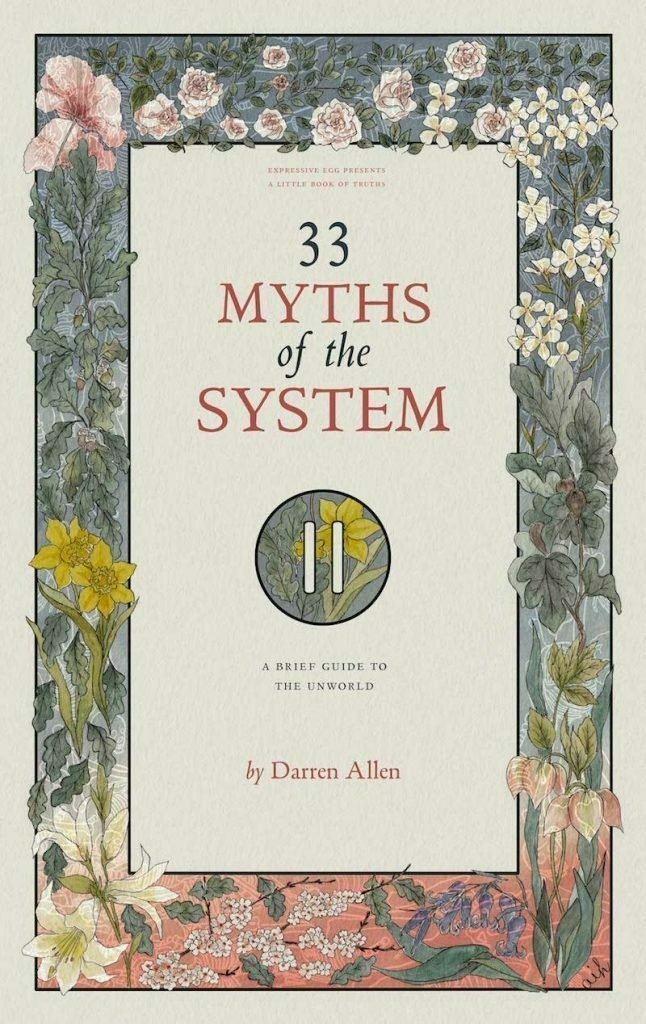
33 Myths of the System
Drawing on the entire history of radical thought, while seeking to plumb their common depths, 33 Myths of the System, presents a synthesis of independent criticism, a straightforward exposure of the justifications of the world-system, along with a new way to perceive and understand the unhappy supermind that directs, penetrates and even lives our lives.
Darren Allen
While I didn't agree with absolutely everything in this free e-book, it's fair to say it blew my mind. Highly recommended, especially for thoughtful people. One of the best things I've read in the last decade in terms of getting me to question... everything.
A catastrophe at Twitter
In any case, Twitter’s response to the incident offered further cause for distress. The company’s initial tweet on the subject said almost nothing, and two hours later it had followed only to say what many users were forced to discover for themselves: that Twitter had disabled the ability of many verified users to tweet or reset their passwords while it worked to resolve the hack’s underlying cause.
The near-silencing of politicians, celebrities, and the national press corps led to much merriment on the service — see this, along with Those good tweets below, for some fun — but the move had other, darker implications. Twitter is, for better and worse, one of the world’s most important communications systems, and among its users are accounts linked to emergency medical services. The National Weather Service in Lincoln, IL, for example, had just tweeted a tornado warning before suddenly going dark. To the extent that anyone was relying on that account for further information about those tornadoes, they were out of luck.
Casey Newton (The INterface)
I didn't actually deactivate my Twitter account because of the hack — that was actually more to do with the book mentioned above — but as a verified user, this certainly reinforced my decision. Just a reminder that at least one person with nuclear codes uses Twitter as their primary means of communication.
This is Fine: Optimism & Emergency in the P2P Network
Centralised platforms crave data collection and thirst for trust from the communities they seek to exploit. These platforms sell bloated, overpowered hardware that cannot be repaired, vulnerable to drops in consumer spending or spasms in the supply chain. They anxiously eye legislation to compel encryption backdoors, which will further weaken the trust they need so badly. They wobble beneath network disruptions (such as the worldwide slowdowns in March under COVID-19 load surges) that incapacitate cloud-dependent devices. They sleep with one eye open in countries where authoritarian governments compel them or their employees to operate as an informal arm of enforcement. These current trajectories point to the accelerating erosion of centralised platform power.
Cade Diehm (The New Design Congress)
This is an incredible article that's very well presented. I keep talking about the importance of decentralisation, and this article backs that up — but also explains how and why decentralised social networks need to do better.

Our remote work future is going to suck
While the upsides to remote work are true, for many people remote work is a poison pill — one where you are given “control” in the name of productivity in exchange for some pretty nasty long-term effects.
In reality, remote work makes you vulnerable to outsourcing, reduces your job to a metric, creates frustrating change-averse bureaucracies, and stifles your career growth. The lack of scrutiny our remote future faces is going to result in frustrated workers and ineffective companies.
Sean Blanda
I'm a proponent of remote work, but I was nodding along to many of the points made in this post. Context is everything, and there's something to be said about being able to go home to escape work.
CO2 emissions on the web
Your content site probably doesn’t need JavaScript. You probably don’t need a CSS framework. You probably don’t need a custom font. Use responsive images. Extend your HTTP cache lifetimes. Use a static site generator or wp2static.com instead of dynamically generating each page on the fly, despite never changing. Consider ditching that third-party analytics service that you never look at anyway, especially if they also happen to sell ads. Run your website through websitecarbon.com. Choose a green web host.
Danny van Kooten
This week I changed the theme over at my personal blog to one that is much lighter. When I shared what I'd done on Mastodon, someone commented that they didn't think it would make that much difference. This post was written by someone who popped up to rebut what they said.
Ask a Sane Person: Jia Tolentino on Practicing the Discipline of Hope
INTERVIEW: What has this pandemic confirmed or reinforced about your view of society?
TOLENTINO: That capitalist individualism has turned into a death cult; that the internet is a weak substitute for physical presence; that this country criminally undervalues its most important people and its most important forms of labor; that we’re incentivized through online mechanisms to value the representation of something (like justice) over the thing itself; that most of us hold more unknown potential, more negative capability, than we’re accustomed to accessing; that the material conditions of life in America are constructed and maintained by those best set up to exploit them; and that the way we live is not inevitable at all.
Christopher Bollen
I have to confess to not knowing who Jia Tolentino was before stumbling across this via the Hurry Slowly newsletter (although I must have read her writing before). This is a fantastic interview, which you should read in its entirety.
Header image by Fab Lentz
Saturday shakings
Whew, so many useful bookmarks to re-read for this week’s roundup! It took me a while, so let’s get on with it…
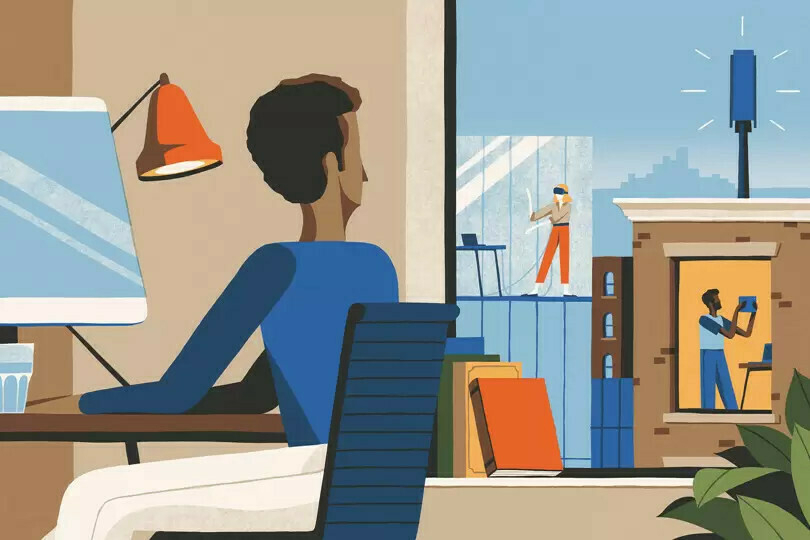
What is the future of distributed work?
To Bharat Mediratta, chief technology officer at Dropbox, the quarantine experience has highlighted a huge gap in the market. “What we have right now is a bunch of different productivity and collaboration tools that are stitched together. So I will do my product design in Figma, and then I will submit the code change on GitHub, I will push the product out live on AWS, and then I will communicate with my team using Gmail and Slack and Zoom,” he says. “We have all that technology now, but we don't yet have the ‘digital knowledge worker operating system’ to bring it all together.”
WIRED
OK, so this is a sponsored post by Dropbox on the WIRED website, but what it highlights is interesting. For example, Monday.com (which our co-op uses) rebranded itself a few months ago as a 'Work OS'. There's definitely a lot of money to be made for whoever manages to build an integrated solution, although I think we're a long way off something which is flexible enough for every use case.
The Definition of Success Is Autonomy
Today, I don’t define success the way that I did when I was younger. I don’t measure it in copies sold or dollars earned. I measure it in what my days look like and the quality of my creative expression: Do I have time to write? Can I say what I think? Do I direct my schedule or does my schedule direct me? Is my life enjoyable or is it a chore?
Ryan Holiday
Tim Ferriss has this question he asks podcast guests: "If you could have a gigantic billboard anywhere with anything on it what would it say and why?" I feel like the title of this blog post is one of the answers I would give to that question.
Do The Work
We are a small group of volunteers who met as members of the Higher Ed Learning Collective. We were inspired by the initial demand, and the idea of self-study, interracial groups. The initial decision to form this initiative is based on the myriad calls from people of color for white-bodied people to do internal work. To do the work, we are developing a space for all individuals to read, share, discuss, and interrogate perspectives on race, racism, anti-racism, identity in an educational setting. To ensure that the fight continues for justice, we need to participate in our own ongoing reflection of self and biases. We need to examine ourselves, ask questions, and learn to examine our own perspectives. We need to get uncomfortable in asking ourselves tough questions, with an understanding that this is a lifelong, ongoing process of learning.
Ian O'Byrne
This is a fantastic resource for people who, like me, are going on a learning journey at the moment. I've found the podcast Seeing White by Scene on Radio particularly enlightening, and at times mind-blowing. Also, the Netflix documentary 13th is excellent, and available on YouTube.
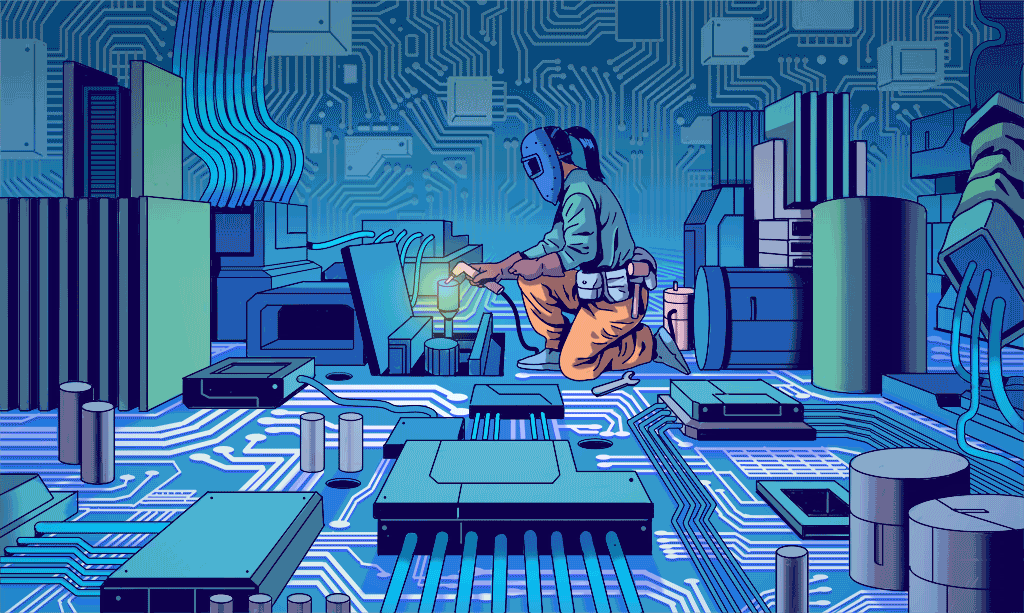
How to Make Your Tech Last Longer
If we put a small amount of time into caring for our gadgets, they can last indefinitely. We’d also be doing the world a favor. By elongating the life of our gadgets, we put more use into the energy, materials and human labor invested in creating the product.
Brian X. Chen (The new York times)
This is a pretty surface-level article that basically suggests people take their smartphone to a repair shop instead of buying a new one. What it doesn't mention is that aftermarket operating systems such as the Android-based LineageOS can extend the lifetime of smartphones by providing security updates long beyond those provided by vendors.
Law enforcement arrests hundreds after compromising encrypted chat system
EncroChat sold customized Android handsets with GPS, camera, and microphone functionality removed. They were loaded with encrypted messaging apps as well as a secure secondary operating system (in addition to Android). The phones also came with a self-destruct feature that wiped the device if you entered a PIN.
The service had customers in 140 countries. While it was billed as a legitimate platform, anonymous sources told Motherboard that it was widely used among criminal groups, including drug trafficking organizations, cartels, and gangs, as well as hitmen and assassins.
EncroChat didn’t become aware that its devices had been breached until May after some users noticed that the wipe function wasn’t working. After trying and failing to restore the features and monitor the malware, EncroChat cut its SIM service and shut down the network, advising customers to dispose of their devices.
Monica Chin (The Verge)
It goes without saying that I don't want assassins, drug traffickers, and mafia types to be successful in life. However, I'm always a little concerned when there are attacks on encryption, as they're compromising systems also potentially used by protesters, activists, and those who oppose the status quo.
Uncovered: 1,000 phrases that incorrectly trigger Alexa, Siri, and Google Assistant
The findings demonstrate how common it is for dialog in TV shows and other sources to produce false triggers that cause the devices to turn on, sometimes sending nearby sounds to Amazon, Apple, Google, or other manufacturers. In all, researchers uncovered more than 1,000 word sequences—including those from Game of Thrones, Modern Family, House of Cards, and news broadcasts—that incorrectly trigger the devices.
“The devices are intentionally programmed in a somewhat forgiving manner, because they are supposed to be able to understand their humans,” one of the researchers, Dorothea Kolossa, said. “Therefore, they are more likely to start up once too often rather than not at all.”
Dan Goodin (Ars Technica)
As anyone with voice assistant-enabled devices in their home will testify, the number of times they accidentally spin up, or misunderstand what you're saying can be amusing. But we can and should be wary of what's being listened to, and why.
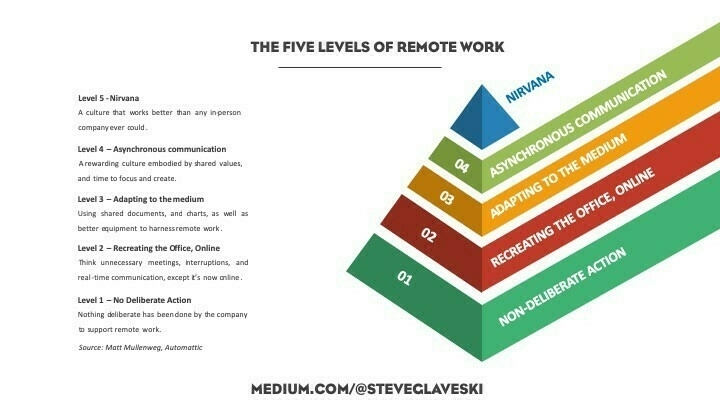
The Five Levels of Remote Work — and why you’re probably at Level 2
Effective written communication becomes critical the more companies embrace remote work. With an aversion to ‘jumping on calls’ at a whim, and a preference for asynchronous communication... [most] communications [are] text-based, and so articulate and timely articulation becomes key.
Steve Glaveski (The Startup)
This is from March and pretty clickbait-y, but everyone wants to know how they can improve - especially if didn't work remotely before the pandemic. My experience is that actually most people are at Level 3 and, of course, I'd say that I and my co-op colleagues are at Level 5 given our experience...
Why Birds Can Fly Over Mount Everest
All mammals, including us, breathe in through the same opening that we breathe out. Can you imagine if our digestive system worked the same way? What if the food we put in our mouths, after digestion, came out the same way? It doesn’t bear thinking about! Luckily, for digestion, we have a separate in and out. And that’s what the birds have with their lungs: an in point and an out point. They also have air sacs and hollow spaces in their bones. When they breathe in, half of the good air (with oxygen) goes into these hollow spaces, and the other half goes into their lungs through the rear entrance. When they breathe out, the good air that has been stored in the hollow places now also goes into their lungs through that rear entrance, and the bad air (carbon dioxide and water vapor) is pushed out the front exit. So it doesn’t matter whether birds are breathing in or out: Good air is always going in one direction through their lungs, pushing all the bad air out ahead of it.
Walter Murch (Nautilus)
Incredible. Birds are badass (and also basically dinosaurs).
Montaigne Fled the Plague, and Found Himself
In the many essays of his life he discovered the importance of the moderate life. In his final essay, “On Experience,” Montaigne reveals that “greatness of soul is not so much pressing upward and forward as knowing how to circumscribe and set oneself in order.” What he finds, quite simply, is the importance of the moderate life. We must then, he writes, “compose our character, not compose books.” There is nothing paradoxical about this because his literary essays helped him better essay his life. The lesson he takes from this trial might be relevant for our own trial: “Our great and glorious masterpiece is to live properly.”
Robert Zaresky (The New York Times)
Every week, Bryan Alexander replies to the weekly Thought Shrapnel newsletter. Last week, he sent this article to both me and Chris Lott (who produces the excellent Notabilia).
We had a bit of a chat, with us sharing our love of How to Live: A Life of Montaigne in One Question and Twenty Attempts at An Answer by Sarah Bakewell, and well as the useful tidbits it's possible glean from Stefan Zweig's short biography simply entitled Montaigne.
Header image by Nicolas Comte
Saturday shiftings
I think this is the latest I've published my weekly roundup of links. That's partly because of an epic family walk we did today, but also because of work, and because of the length and quality of the things I bookmarked to come back to...
Enjoy!

FC97: Portal Economics
Most of us are still trapped in the mental coordinates of a world that isn’t waiting for us on the other side. You can see this in the language journalists are still using. The coronavirus is a ‘strategic surprise’ and we’re still very much in the ‘fog of war,’ dealing with the equivalent of an ‘alien invasion’ or an ‘unexpected asteroid strike.’ As I said back in March though, this is not a natural disaster, like an earthquake, a one-off event from which we can rebuild. It’s not a war or a financial crisis either. There are deaths, but no combatants, no physical resources have been destroyed, and there was no initial market crash, although obviously the markets are now reacting.
The crisis is of the entire system we’ve built. In another article, I described this as the bio-political straitjacket. We can’t reopen our economies, because if we do then more people will die. We can’t keep them closed either, because our entire way of life is built on growth, and without it, everything collapses. We can give up our civil liberties, submitting to more surveillance and control, but as Amartya Sen would say, what good is a society if the cost of our health and livelihoods is our hard fought for freedoms?
Gus Hurvey (Future Crunch)
This is an incredible read, and if you click through to anything this week to sit down and consume with your favourite beverage, I highly recommend this one.
Coronavirus shows us it’s time to rethink everything. Let's start with education
There’s nothing radical about the things we’re learning: it’s a matter of emphasis more than content – of centralising what is most important. Now, perhaps, we have an opportunity to rethink the entire basis of education. As local authorities in Scotland point out, outdoor learning could be the best means of getting children back to school, as it permits physical distancing. It lends itself to re-engagement with the living world. But, despite years of research demonstrating its many benefits, the funding for outdoor education and adventure learning has been cut to almost nothing.
George Monbiot (The Guardian)
To some extent, this is Monbiot using a different stick to bang the same drum, but he certainly has a point about the most important things to be teaching our young people as their future begins to look a lot different to ours.
The Machine Pauses
In 1909, following a watershed era of technological progress, but preceding the industrialized massacres of the Somme and Verdun, E.M. Forster imagined, in “The Machine Stops,” a future society in which the entirety of lived experience is administered by a kind of mechanical demiurge. The story is the perfect allegory for the moment, owing not least to its account of a society-wide sudden stop and its eerily prescient description of isolated lives experienced wholly through screens.
Stuart Whatley (The Hedgehog Review)
No, I didn't know what a 'demiurge' was either. Apparently, it's "an artisan-like figure responsible for fashioning and maintaining the physical universe".
This article, which not only quote E.M. Forster, but also Heidegger and Nathaniel Hawthorne, discusses whether we really should be allowing technology to dictate the momentum of society.
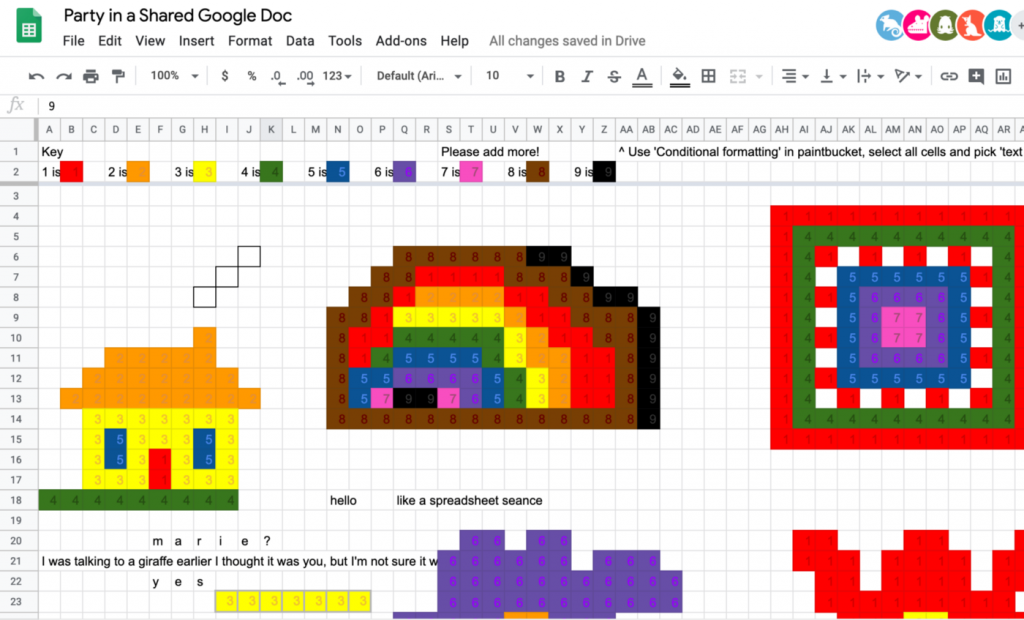
Party in a Shared Google Doc
The party has no communal chat log. Whilst I can enable edit permissions for those with the party link, shared google docs don’t not allow for chat between anonymous animals. Instead conversations are typed in cells. There are too many animals to keep track of who is who. I stop and type to someone in a nearby cell. My cursor is blue, theirs is orange. I have no idea if they are a close friend or a total stranger. How do you hold yourself and what do you say to someone when personal context is totally stripped away?
Marie Foulston
I love this so much.
Being messy when everything is clean
[T]o put it another way, people whose working lives can be mediated through technology — conducted from bedrooms and kitchen tables via Teams or Slack, email and video calls — are at much less risk. In fact, our laptops and smartphones might almost be said to be saving our lives. This is an unintended consequence of remote working, but it is certainly a new reality that needs to be confronted and understood.
And many people who can work from a laptop are also less likely to lose their jobs than people who work in the service and hospitality industries, especially those who have well-developed professional networks and high social capital. According to The Economist, this group are having a much better lockdown than most — homeschooling notwithstanding. But then, they probably also had a more comfortable life beforehand.
Rachel Coldicutt (Glimmers)
This post, "a scrapbook of links and questions that explore how civil society might be in a digital world," is a really interesting look at the physicality of our increasingly-digital world and how the messiness of human life is being 'cleaned up' by technology.
Remote work worsens inequality by mostly helping high-income earners
Given its potential benefits, telecommuting is an attractive option to many. Studies have shown a substantial number of workers would even agree to a lower salary for a job that would allow them to work from home. The appeal of remote work can be especially strong during times of crisis, but also exists under more normal circumstances.
The ongoing crisis therefore amplifies inequalities when it comes to financial and work-life balance benefits. If there’s a broader future adoption of telecommuting, a likely result of the current situation, that would still mean a large portion of the working population, many of them low-income workers, would be disadvantaged
Georges A. Tanguay & Ugo Lachapelle (The Conversation)
There's some interesting graphs included in this Canadian study of remote work. While I've written plenty about remote work before, I don't think I've really touched on how much it reinforces white, middle-class, male privilege.
The BBC has an article entitled Why are some people better at working from home than others? which suggests that succeeding and/or flourishing in a remote work situation is down to the individual, rather than the context. The truth is, it's almost always easier to be a man in a work environement — remote, or otherwise. This is something we need to change.

A first look at Unreal Engine 5
We’ve just released a first look at Unreal Engine 5. One of our goals in this next generation is to achieve photorealism on par with movie CG and real life, and put it within practical reach of development teams of all sizes through highly productive tools and content libraries.
I remember showing my late grandmother FIFA 18 and her not being able to tell the difference between it and the football she watched regularly on the television.
Even if you're not a gamer, you'll find this video incredible. It shows how, from early next year, cinematic-quality experiences will be within grasp of even small development teams.
Grand illusion: how the pandemic exposed we're all just pretending
Our pretending we’re not drowning is the proof we have that we might still be worth saving. Our performing stability is one of the few ways that we hope we might navigate the narrow avenues that might still get us out.
A thing, though, about perpetuating misperceptions, about pretending – because you’re busy surviving, because you can’t stop playing the rigged game on the off-chance somehow that you might outsmart it, because you can’t help but feel like your circumstances must somehow be your fault – is that it makes it that much harder for any individual within the group to tell the truth.
Lynn Steger Strong (The Guardian)
Wouldn't be amazing if we collectively turned to one another, recognised our collective desire not to play 'the game' any more, and decided to go after those who have rigged the system against us?
How to improve your walking technique
What research shows is that how we walk, our gait mechanics, isn’t as “natural” as we might believe. We learn to walk by observing our parents and the world around us. As we grow up, we embody the patterns we see. These can limit the full potential of our gait. Some of us unconsciouly prevent the pelvis and arms from swinging because of cultural taboos that frown upon having a gait as being, for example, too free.
Suunto
My late, great, friend Dai Barnes was a barefoot runner. He used to talk a lot about how people walk and run incorrectly, partly because of the 'unnatural' cushioning of their feet. This article gives some advice on improving your walking gait, which I tried out today on a long family walk.
Header mage via xkcd
Saturday sandcastles
The photos of brutalist sandcastles accompanying this week's link roundup made me both smile and really miss care-free walks on the beach. Although technically we're still allowed to visit the coast, our local council has closed nearby car parks.
This week I've been busy, busy, but managed to squeeze in a bit of non-fiction reading, the best of which I'm sharing below. Oh, and one link that I can' really quote is UnblockIt which was shared via our team chat this week. If your ISP filters certain sites, you might want to bookmark it...
There will be no 'back to normal'
In this article, we summarise and synthesise various - often opposing - views about how the world might change. Clearly, these are speculative; no-one knows what the future will look like. But we do know that crises invariably prompt deep and unexpected shifts, so that those anticipating a return to pre-pandemic normality may be shocked to find that many of the previous systems, structures, norms and jobs have disappeared and will not return.
Nesta
I'm going to return to this article time and again, as it breaks down in a really helpful way what's likely to happen post-pandemic in the following areas: political, economic, sociocultural, technological, legal, and environmental.
Plan for 5 years of lockdown
I’m attempting to be pragmatic. I think this is one of those times where we should hope for the best but plan for the worst. Crucially, I think that a terrifying number of people are in denial about the timescales of disruption that Covid-19 will cause, and this is causing them to make horrible personal and professional decisions. I believe that we have a responsibility to consider any reasonably likely worst case scenario, and take appropriate steps to mitigate it. But to do that we have to be honest about the worst case.
Patrick Gleeson
It's hard to disagree with the points made in this post, especially as the scenario planning that universities are doing seems to point in the same direction. Having said that, I don't think 'lockdown' will mean the same thing everywhere and at each stage of the pandemic.
'Will coronavirus change our attitudes to death? Quite the opposite'
For centuries, people used religion as a defence mechanism, believing that they would exist for ever in the afterlife. Now people sometimes switch to using science as an alternative defence mechanism, believing that doctors will always save them, and that they will live for ever in their apartment. We need a balanced approach here. We should trust science to deal with epidemics, but we should still shoulder the burden of dealing with our individual mortality and transience.
The present crisis might indeed make many individuals more aware of the impermanent nature of human life and human achievements. Nevertheless, our modern civilisation as a whole will most probably go in the opposite direction. Reminded of its fragility, it will react by building stronger defences. When the present crisis is over, I don’t expect we will see a significant increase in the budgets of philosophy departments. But I bet we will see a massive increase in the budgets of medical schools and healthcare systems.
Yuval Noah Harari
Some amazing writing, as ever, by Harari, who argues that, because our secular societies focus on the here and now rather than the afterlife, science has almost become a religion.

A startup debt to talk about more: emotional debt
We incur emotional debt whenever there’s an experience we’ve had, but not fully digested in all aspects of it. In my trauma therapy training I learned that this is in fact a natural and important human survival skill. Imagine you’re living in a pre-historic village and it gets raided by a neighboring tribe. Although no one gets killed, a number of houses have been burned down and food has been stolen. The next morning the most important tasks for everyone are to protect the village again, rebuild the houses and hunt for food to survive. Many of the villagers will have been deeply traumatized from the fears and terror they experienced in their bodies. Since food and shelter takes first priority to humans, not processing these emotions for now is a debt that’s necessary and important to incur. We can put it aside and leave it stuck in our bodies, ready to reengage and digest it later. It’s a great survival feature if you will.
A couple of weeks later when everything has been rebuilt, there might be a chance for the local shaman to offer a ritual around the fireplace where everyone can gather and re-experience the emotions that were too difficult to deal with at the actual event of the raid: the rage and anger towards the attackers, the fear and the terror over their lives and eventually the grief for the loss of their goods and most importantly their safety. Once that has been felt and integrated, everyone is able to move on and the night of the village raid can safely go into the history books, fairy tales and heroes journey accounts that luckily everyone survived, yet learned from.
Leo Widrich
While this is framed in terms of startups, I think every organisation has 'emotional debt' that they have to deal with. I like this framing, and will be using it from now on to explain why teams need times of compression and decompression (instead of never-ending 'sprints').
Don’t let remote leadership bring out the worst in you
Recognize that the pressure you apply is a reaction to a construct of control. You think you can control people – and things – and the reality is you can’t. The quicker you can realize this, the sooner you can shift to a frame of mind where you can focus constructively on the things that actually help your team, such as: (1) Making it clear why the work matters (2) Creating milestones to help that person achieve that work (3) Giving as much context as possible so they can make the best decisions (4) Helping them think through tough problems they encounter.
Claire Lew
I've led a remote team for a couple of years now, and worked remotely for six years before that. Despite this, it's easy to fall into bad habits, so this is a useful article to remind all leaders (most of whom are remote now!) that the amount of time someone spends on something does not equate to progress made.
Google Apple Contact Tracing (GACT): a wolf in sheep’s clothes.
But the bigger picture is this: it creates a platform for contact tracing that works all across the globe for most modern smart phones (Android Marshmallow and up, and iOS 13 capable devices) across both OS platforms. Unless appropriate safeguards are in place (including, but not limited to, the design of the system as described above – we will discuss this more below) this would create a global mass-surveillance system that would reliably track who has been in contact with whom, at what time and for how long. (And where, if GPS is used to record the location.) GACT works much more reliably and extensively than any other system based on either GPS or mobile phone location data (based on cell towers) would be able to (under normal conditions). I want to stress this point because some people have responded to this threat saying that this is something companies like Google (using their GPS and WiFi names based location history tool) can already do for years. This is not the case. This type of contact tracing really brings it to another level.
Jaap-Henk Hoepman
This, by a professor in the Netherlands who focuses on 'privacy by design' is why I'm really concerned about the Google/Apple Contact Tracing (GACT) programme. It's only likely to be of marginal help in fighting the virus, but sets up a global surveillance network for decades to come.

In this Zombie Apocalypse, your Homework is due at 5pm
Year in and year out, when school’s in, children know that they are to be at certain places at certain times, doing particular tasks in particular ways. And now, weeks loom ahead where they are faced with many of the same tasks, absent of all the pomp and circumstance. This is the ultimate zombie apocalypse nightmare—a pandemic has hit the world with a mighty force, schools and tuition centers are shut, and homework is still due. Children are adaptable creatures, but it will be challenging for many, if not most, to do all that they are expected to do under these altered conditions.
Youyenn Teo
I was attracted to this article by its great title, but it's actually an interesting insight into both education in a Singaporean context and the gendered nature of care in our societies.
Free Money for Surfers: A Genealogy of the Idea of Universal Basic Income
As cash transfers are increasingly seen as the ideal way to confront the magnitude of the coronavirus threat, it is unclear whether our political imagination is truly up to the task. The current crisis might accelerate rather than decrease our dependency on the market, strengthening capital’s grip on society. Large-scale public works are evidently unfeasible with physical distancing. But, with a clear medical equipment shortage and lacking trained personnel, there is obvious space for public planning responses, and “production for use value” seems ever more necessary. None of these ills will be solved by cash transfers.
Anton Jäger & Daniel Zamora
This, in the Los Angeles Review of Books, considers a new work by Peter Sloman entitled The Idea of a Guaranteed Income and the Politics of Redistribution in Modern Britain. Having previously been cautiously optimistic about Universal Basic Income (or 'cash transfers') I'm not so sure it would all work out so well. I'd rather we funded things like the NHS, but then that might be my white male privilege speaking.
How we made the Keep Calm and Carry On poster
I first found the poster in 2000, folded up at the bottom of a box of books we had bought at an auction. I liked it straight away and showed it to my wife Mary – she had it framed and put up in the shop. The next thing we found was that customers wanted to buy it. I suggested we make copies but Mary said: “No, it’ll spoil the purity.” She went away for a week’s holiday, so I secretly got 500 copies made.
Stuart Manley (interviewed by malcolm jack)
This ridiculously-famous poster was discovered in a wonderful second-hand bookshop not too far away from us, and which we visit several times per year. I love the story behind it.
Images via The Guardian: For one tide only: modernist sandcastles – in pictures
We are too busy mopping the floor to turn off the faucet
Pandemics, remote work, and global phase shifts
Last week, I tweeted this:
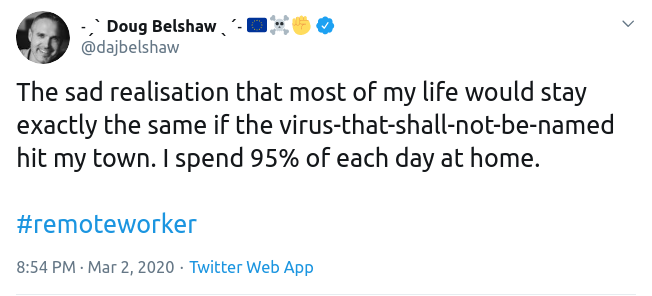
I get the feeling that, between film and TV shows on Netflix, Amazon deliveries, and social interaction on Twitter and Mastodon, beyond close friends and family, no-one would even realise if I'd been quarantined.
Writing in The Atlantic, Ian Bogost points out that Every Place Is the Same Now, because you go to every place with your personal screen, a digital portal to the wider world.
Anywhere has become as good as anywhere else. The office is a suitable place for tapping out emails, but so is the bed, or the toilet. You can watch television in the den—but also in the car, or at the coffee shop, turning those spaces into impromptu theaters. Grocery shopping can be done via an app while waiting for the kids’ recital to start. Habits like these compress time, but they also transform space. Nowhere feels especially remarkable, and every place adopts the pleasures and burdens of every other. It’s possible to do so much from home, so why leave at all?
Ian Bogost (The Atlantic)
If you're a knowledge worker, someone who deals with ideas and virtual objects rather than things in 'meatspace', then there is nothing tying you to a particular geographical place. This may be liberating, but it's also quite... weird.
It’s easy but disorienting, and it makes the home into a very strange space. Until the 20th century, one had to leave the house for almost anything: to work, to eat or shop, to entertain yourself, to see other people. For decades, a family might have a single radio, then a few radios and a single television set. The possibilities available outside the home were far greater than those within its walls. But now, it’s not merely possible to do almost anything from home—it’s also the easiest option. Our forebears’ problem has been inverted: Now home is a prison of convenience that we need special help to escape.
Ian Bogost (The Atlantic)
I've worked from home for the last eight years, and now can't imagine going back to working any other way. Granted, I get to travel pretty much every month, but that 95% being-at-home statistic still includes my multi-day international trips.
I haven't watched it recently, but in 2009 a film called Surrogates starring Bruce Willis foreshadowed the kind of world we're creating. Here's the synopsis via IMDB:
People are living their lives remotely from the safety of their own homes via robotic surrogates — sexy, physically perfect mechanical representations of themselves. It's an ideal world where crime, pain, fear and consequences don't exist. When the first murder in years jolts this utopia, FBI agent Greer discovers a vast conspiracy behind the surrogate phenomenon and must abandon his own surrogate, risking his life to unravel the mystery.
IMDB
If we replace the word 'robotic' with 'virtual' in this plot summary, then it's a close approximation to the world in which some of us now live. Facetuned Instagram selfies project a perfect life. We construct our own narratives and then believe the story we have concocted. Everything is amazing but no-one's happy.
Even Zoom, the videoconferencing software I use most days for work, has an option to smooth out wrinkles, change your background, and make everything look a bit more sparkly. Our offline lives can be gloriously mundane, but online, thanks to various digital effects, we can make them look glorious. And why wouldn't we?
I think we'll see people and businesses optimising for how they look and sound online, including recruitment. The ability to communicate effectively at a distance with people who you may never meet in person is a skill that's going to be in high demand, if it isn't already.
Remote working may be a trend, but one which is stubbornly resisted by some bosses who are convinced they have to keep a close eye on employees to get any work out of them.
However, when those bosses are forced to implement remote working policies to keep their businesses afloat, and nothing bad happens as a result, this attitude can, and probably will, change. Remote working, when done properly, is not only more cost-effective for businesses, but often leads to higher productivity and self-reported worker happiness.
Being 'good in the room' is fine, and I'm sure it will always be highly prized, but I also see confident, open working practices as something that's rising in perceived value. Chairing successful online meetings is at least as important as chairing ones offline, for example. We need to think of ways of being able recognise these remote working skills, as it's not something in which you can receive a diploma.
For workers, of course, there are so many benefits of working from home that I'm not even sure where to start. Your health, relationships, and happiness are just three things that are likely to dramatically improve when you start working remotely.
For example, let's just take the commute. This dominates the lives of non-remote workers, usually taking an hour or more out of a their day — every day. Commuting is tiring and inconvenient, but people are currently willing to put up with long commutes to afford a decently-sized house, or to live in a nicer area.
So, let's imagine that because of the current pandemic (which some are calling the world's biggest remote-working experiment) businesses decide that having their workers being based from home has multi-faceted benefits. What happens next?
Well, if a large percentage (say we got up to ~50%) of the working population started working remotely over the next few months and years, this would have a knock-on effect. We'd see changes in:
...to name but a few. I think it would be a huge net benefit for society, and hopefully allow for much greater civic engagement and democratic participation.
I'll conclude with a quotation from Nafeez Ahmed's excellent (long!) post on what he's calling a global phase shift. Medium says it's a 30-minute read, but I reckon it's about half that.
Ahmed points out in stark detail the crisis, potential future scenarios, and the opportunity we've got. I particularly appreciate his focus on the complete futility of what he calls "a raw, ‘fend for yourself’ approach". We must work together to solve the world's problems.
The coronavirus outbreak is, ultimately, a lesson in not just the inherent systemic fragilities in industrial civilization, but also the limits of its underlying paradigm. This is a paradigm premised on a specific theory of human nature, the neoclassical view of Homo-Economicus, human beings as dislocated units which compete with each other to maximise their material self-gratification through endless consumption and production. That paradigm and its values have brought us so far in our journey as a species, but they have long outlasted their usefulness and now threaten to undermine our societies, and even our survival as a species.
Getting through coronavirus will be an exercise not just in building societal resilience, but relearning the values of cooperation, compassion, generosity and kindness, and building systems which institutionalize these values. It is high time to recognize that such ethical values are not simply human constructs, products of socialization. They are cognitive categories which reflect patterns of behaviour in individuals and organizations that have an evolutionary, adaptive function. In the global phase shift, systems which fail to incorporate these values into their structures will eventually die.
Nafeez Ahmed
Just as crises can be manufactured by totalitarian regimes to seize power and control populations, perhaps natural crises can be used to make us collectively realise we need to pull together?
Enjoy this? Sign up for the weekly roundup, become a supporter, or download Thought Shrapnel Vol.1: Personal Productivity!
Header image by pan xiaozhen. Anonymous quotation-as-title taken from Scott Klososky's The Velocity Manifesto
Friday facings
This week's links seem to have a theme about faces and looking at them through screens. I'm not sure what that says about either my network, or my interests, but there we are...
As ever, let me know what resonates with you, and if you have any thoughts on what's shared below!
The Age of Instagram Face
The human body is an unusual sort of Instagram subject: it can be adjusted, with the right kind of effort, to perform better and better over time. Art directors at magazines have long edited photos of celebrities to better match unrealistic beauty standards; now you can do that to pictures of yourself with just a few taps on your phone.
Jia Tolentino (The New Yorker)
People, especially women, but there's increasing pressure on young men too, are literally going to see plastic surgeons with 'Facetuned' versions of themselves. It's hard not to think that we're heading for a kind of dystopia when people want to look like cartoonish versions of themselves.
What Makes A Good Person?
What I learned as a child is that most people don’t even meet the responsibilities of their positions (husband, wife, teacher, boss, politicians, whatever.) A few do their duty, and I honor them for it, because it is rare. But to go beyond that and actually be a man of honor is unbelievably rare.
Ian Welsh
This question, as I've been talking with my therapist about, is one I ask myself all the time. Recently, I've settled on Marcus Aurelius' approach: "Waste no more time arguing about what a good man should be. Be one."
Boredom is but a window to a sunny day beyond the gloom
Boredom can be our way of telling ourselves that we are not spending our time as well as we could, that we should be doing something more enjoyable, more useful, or more fulfilling. From this point of view, boredom is an agent of change and progress, a driver of ambition, shepherding us out into larger, greener pastures.
Neel Burton (Aeon)
As I've discussed before, I'm not so sure about the fetishisation of 'boredom'. It's good to be creative and let the mind wander. But boredom? Nah. There's too much interesting stuff out there.

Resting Risk Face
Unlock your devices with a surgical mask that looks just like you.
I don't usually link to products in this roundup, but I'm not sure this is 100% serious. Good idea, though!
The world's biggest work-from-home experiment has been triggered by coronavirus
For some employees, like teachers who have conducted classes digitally for weeks, working from home can be a nightmare.
Jessie Yeung (CNN)
But in other sectors, this unexpected experiment has been so well received that employers are considering adopting it as a more permanent measure. For those who advocate more flexible working options, the past few weeks mark a possible step toward widespread -- and long-awaited -- reform.
Every cloud has a silver lining, I guess? Working from home is great, especially when you have a decent setup.
Setting Up Your Webcam, Lights, and Audio for Remote Work, Podcasting, Videos, and Streaming
Only you really know what level of clarity you want from each piece of your setup. Are you happy with what you have? Please, dear Lord, don't spend any money. This is intended to be a resource if you want more and don't know how to do it, not a stress or a judgment to anyone happy with their current setup
And while it's a lot of fun to have a really high-quality webcam for my remote work, would I have bought it if I didn't have a more intense need for high quality video for my YouTube stuff? Hell no. Get what you need, in your budget. This is just a resource.
This is a fantastic guide. I bought a great webcam when I saw it drop in price via CamelCamelCamel and bought a decent mic when I recorded the TIDE podcast wiht Dai. It really does make a difference.
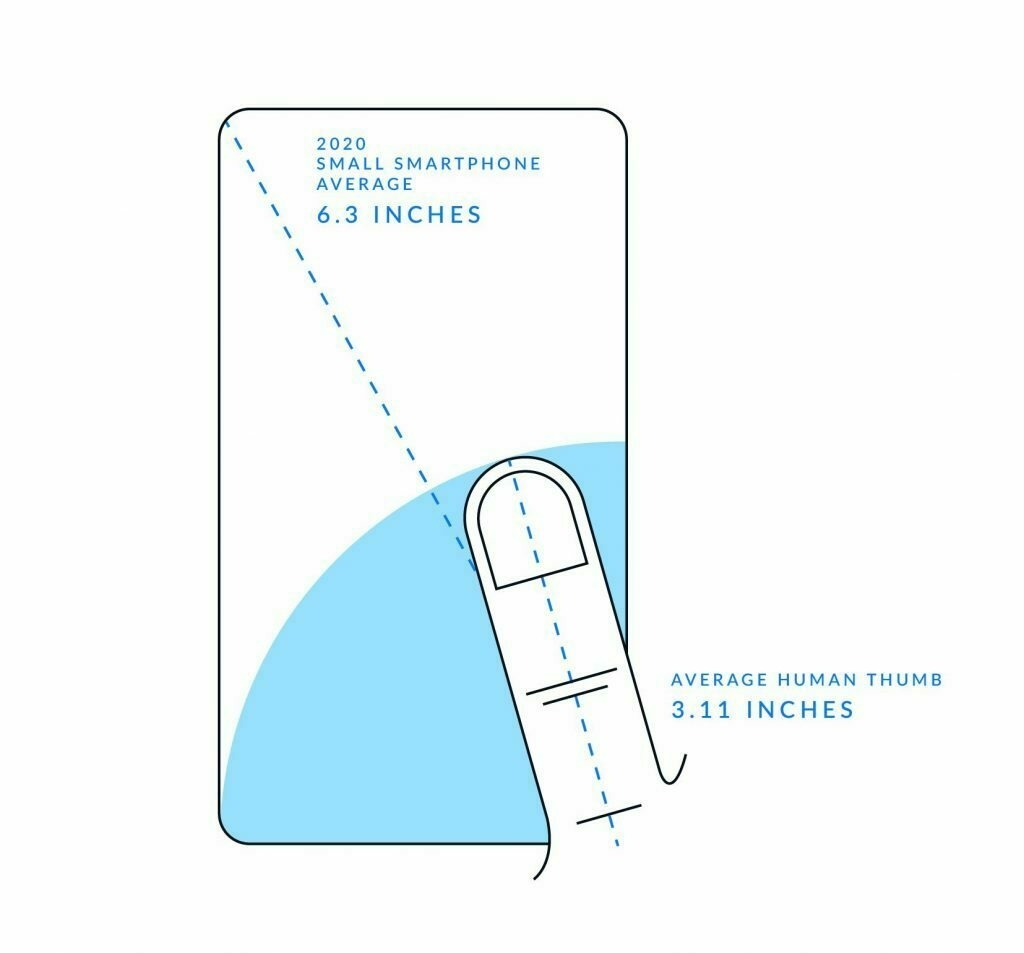
Large screen phones: a challenge for UX design (and human hands)
I know it might sound like I have more questions than answers, but it seems to me that we are missing out on a very basic solution for the screen size problem. Manufacturers did so much to increase the screen size, computational power and battery capacity whilst keeping phones thin, that switching the apps navigation to the bottom should have been the automatic response to this new paradigm.
Maria Grilo (Imaginary Cloud)
The struggle is real. I invested in a new phone this week (a OnePlus 7 Pro 5G) and, unlike the phone it replaced from 2017, it's definitely a hold-with-two-hands device.
Society Desperately Needs An Alternative Web
What has also transpired is a web of unbridled opportunism and exploitation, uncertainty and disparity. We see increasing pockets of silos and echo chambers fueled by anxiety, misplaced trust, and confirmation bias. As the mainstream consumer lays witness to these intentions, we notice a growing marginalization that propels more to unplug from these communities and applications to safeguard their mental health. However, the addiction technology has produced cannot be easily remedied. In the meantime, people continue to suffer.
Hessie Jones (Forbes)
Another call to re-decentralise the web, this time based on arguments about centralised services not being able to handle the scale of abuse and fraudulent activity.
UK Google users could lose EU GDPR data protections
It is understood that Google decided to move its British users out of Irish jurisdiction because it is unclear whether Britain will follow GDPR or adopt other rules that could affect the handling of user data.
If British Google users have their data kept in Ireland, it would be more difficult for British authorities to recover it in criminal investigations.
The recent Cloud Act in the US, however, is expected to make it easier for British authorities to obtain data from US companies. Britain and the US are also on track to negotiate a broader trade agreement.
Samuel Gibbs (The Guardian)
I'm sure this is a business decision as well, but I guess it makes sense given post-Brexit uncertainty about privacy legislation. It's a shame, though, and a little concerning.
Enjoy this? Sign up for the weekly roundup, become a supporter, or download Thought Shrapnel Vol.1: Personal Productivity!
Header image by Luc van Loon
Friday ferretings
These things jumped out at me this week:
Image from Guillermo Acuña fronts his remote Chilean retreat with large wooden staircase (Dezeen)
Remote work is a different beast
You might not work remotely right now, but the chances are that at some point in your career, and in some capacity, you will do. Remote work has its own challenges and benefits, which are alluded to in three articles in Fast Company that I want to highlight. The first is an article summarising a survey Google performed amongst 5,600 of its remote workers.
On the outset of the study, the team hypothesized that distributed teams might not be as productive as their centrally located counterparts. “We were a little nervous about that,” says [Veronica] Gilrane [manager of Google’s People Innovation Lab]. She was surprised to find that distributed teams performed just as well. Unfortunately, she also found that there is a lot more frustration involved in working remotely. Workers in other offices can sometimes feel burdened to sync up their schedules with the main office. They can also feel disconnected from the team.
That doesn't surprise me at all. Even though probably spend less AFK (Away From Keyboard) as a remote worker than I would in an office, there's not that performative element, where you have to look like you're working. Sometimes work doesn't look like work; it looks like going for a run to think about a problem, or bouncing an idea off a neighbour as you walk back to your office with a cup of tea.
The main thing, as this article points out, is that it's really important to have an approach that focuses on results rather than time spent doing the work. You do have to have some process, though:
[I]t’s imperative that you stress disciplinary excellence; workers at home don’t have a manager peering over their shoulder, so they have to act as their own boss and maintain a strict schedule to get things done. Don’t try to dictate every aspect of their lives–remote work is effective because it offers workers flexibility, after all. Nonetheless, be sure that you’re requesting regular status updates, and that you have a system in place to measure productivity.
Fully-remote working is different to 'working from home' a day or two per week. It does take discipline, if only to stop raiding the biscuit tin. But it's also a different mindset, including intentionally sharing your work much more than you'd do in a co-located setting.
Fundamentally, as Greg Galant, CEO of a full-remote organisation, comments, it's about trust:
“My friends always say to me, ‘How do you know if anyone is really working?’ and I always ask them, ‘How do you know if anybody is really working if they are at the office?'” says Galant. “Because the reality is, you can see somebody at their desk and they can stay late, but that doesn’t mean they’re really working.”
[...]
If managers are adhering to traditional management practices, they’re going to feel anxiety with remote teams. They’re going to want to check in constantly to make sure people are working. But checking in constantly prevents work from getting done.
Remote work is strange and difficult to describe to anyone who hasn't experienced it. You can, for example, in the same day feel isolated and lonely, while simultaneously getting annoyed with all of the 'pings' and internal communication coming at you.
At the end of the day, companies need to set expectations, and remote workers need to set boundaries. It's the only way to avoid burnout, and to ensure that what can be a wonderful experience doesn't turn into a nightmare.
Also check out:
Working and leading remotely
As MoodleNet Lead, I’m part of a remote team. If you look at the org chart, I’m nominally the manager of the other three members of my team, but it doesn’t feel like that (at least to me). We’re all working on our areas of expertise and mine happens to be strategy, making sure the team’s OK, and interfacing with the rest of the organisation.
I’m always looking to get better at what I do, so a ‘crash course’ for managing remote teams by Andreas Klinger piqued my interest. There’s a lot of overlap with John O’Duinn’s book on distributed teams, especially in his emphasis of the difference between various types of remote working:
There is a bunch of different setups people call “remote teams”.Using these terms, the Open Badges team at Mozilla was 'Remote first', and when I joined Moodle I was a 'Remote employee', and now the MoodleNet team is 'Fully distributed'.When i speak of remote teams, i mean fully distributed teams and, if done right, remote-first teams. I consider all the other one’s hybrid setups.
Some things are easier when you work remotely, and some things are harder. One thing that’s definitely more difficult is running effective meetings:
Everybody loves meetings… right? But especially for remote teams, they are expensive, take effort and are – frankly – exhausting.I’m a big believer in working openly and documenting all the things. It saves hassle, it makes community contributions easier, and it builds trust. When everything’s out in the open, there’s nowhere to hide.If you are 5 people, remote team:
[...]
And this is not only about meetings. Meetings are just a straightforward example here. It’s true for any aspect of communication or teamwork. Remote teams need 5x the process.
Working remotely is difficult because you have to be emotionally mature to do it effectively. You’re dealing with people who aren’t physically co-present, meaning you have to over-communicate intention, provide empathy at a distance, and not over-react by reading something into a communication that wasn’t intended. This takes time and practice.
Ideally, as remote team lead, you want what Laura Thomson at Mozilla calls Minimum Viable Bureaucracy, meaning that you don’t just get your ducks in a row, you have self-organising ducks. As Klinger points out:
In remote teams, you need to set up in a way people can be as autonomously as they need. Autonomously doesn’t mean “left alone” it means “be able to run alone” (when needed).At the basis of remote work is trust. There’s no way I can see what my colleagues are doing 99% of the time while they’re working on the same project as me. The same goes for me. Some people talk about having to ‘earn’ trust, but once you’ve taken someone through the hiring process, it’s better just to give them your trust until they act in a way which makes you question it.Think of people as “fast decision maker units” and team communication as “slow input/output”. Both are needed to function efficiently, but you want to avoid the slow part when it’s not essential.
Source: Klinger.io (via Dense Discovery)
Dealing with the downsides of remote working
A colleague, who also works remotely, shared this article recently. Although I enjoy working remotely, it’s not without its downsides.
The author, Martin De Wulf, is a coder writing for an audience of software engineers. That’s not me, but I do work in the world of tech. The things that De Wulf says makes remote working stressful are:
How to defuse remote work issues
Good advice here about resolving difficulties with a remote co-worker.
When it comes to delivering feedback, use the same formula that you would in any other feedback situation. First, provide crisp and clear observations of your teammate’s behavior as free of judgment and subjectivity as possible. (For example, instead of “you were rude to me,” try “when you interrupted me as I tried to be heard over the phone…”) Second, describe the impact of the person’s behavior. Phrase the impact as your reaction or impression, not as the objective truth. (“When you talked over me when I was on the conference call, I felt like you don’t respect what I have to say.”) Finally, ask an open-ended question that engages your teammate in a dialogue and helps you to understand one another’s perceptions. (“How did you perceive that call when you were in the meeting room?”) Don’t stop until you each have a clear vision for how a similar situation could play out better the next time.Working remotely is great, but it can be an emotional rollercoaster.
Most of us avoid or delay uncomfortable conversations even with people who sit beside us. It’s natural to dislike confrontation. Now imagine how easy it is to let concerns fester when your teammate is two time zones away. Avoiding an important conversation is a bad idea with an office mate and an even worse idea with a virtual teammate. Get the issues out in the open as quickly as possible before they sour your relationship and affect your ability to get the job done.Source: Harvard Business Review
